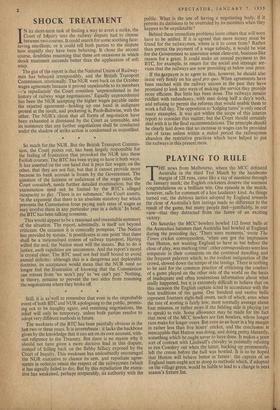SHOCK TREATMENT
IN its short-term task of finding a way to avert a strike, the Court of Inquiry into the railway dispute had to choose between two, courses. It could search for some soothing face- saving emollient; or it could tell both parties to the dispute how stupidly they have been behaving. It chose the second course, doubtless reasoning that there are occasions in which shock treatment. succeeds better than the application of soft soap. The gist of the report is that the National Union of Railway- men has behaved irresponsibly, and the British Transport Commission, irrationally. The NUR went back on the October wages agreement because it proved unpalatable to its members —`a repudiatidn' the Court considers 'unprecedented in the history of railway wage negotiations.' Equally unprecedented has been the NUR accepting the higher wages payable under the rejected agreement—holding up one hand in indignant protest at the insult, and pocketing it, Pooh-Bahwise, with the other. The NUR's claim that all forms of negotiation have been exhausted is dismissed by the Court as untenable, and its insistence that any further negotiations shall be conducted under the shadow of strike action is condemned as unjustified.
* * * So much for ,the NUR. But the British Transport Commis- sion, the Court points out, has been largely responsible for the feeling of frustration that provoked the NUR into these foolish courses: The BTC has been trying to have it both ways. It has asserted 'on the one hand that it pays fair wages; on the other, that they are not fair, but that it cannot provide more because its bank account is frozen by the Government. The question of thg fairness or unfairness of the wage rates, the Court considert, needs further detailed examination; but the examination need not be limited by the BTC's alleged incapacity to day. 'There is no substance,' the Court asserts, `in the argument that there is an absolute statutory bar which prevents the Commission from paying such rates of wages as may involve them in any particular year in a deficit.' 'In brief, ' the BTC has been talking nonsense. This would appear to be a reasoned and reasonable summary of the situation. The report, admittedly, is itself not beyond criticism. On occasion it is comically pompous. 'The Nation has provided by statute,' it pontificates at one point 'that there shall be a nationalised system of railway transport. Having willed the end, the Nation must will the means.' But to do it justice, such vapidities are uncommon. And the report's moral is crystal clear. The BTC need not feel itself bound to avoid annual deficits: although this is a dangerous and deplorable doctrine, its acceptance would mean that the NUR need no longer feel the frustration of knowing that the Commission can retreat from 'we won't pay' to 'we can't pay.' Nothing, in theory, remains to prevent the two sides from resuming the negotiations where they broke off.
Still, it is as' well to remember that even in the improbable event of both BTC and NUR apologising to the public, promis- ing not to be haughty again, and resuming negotiations, the relief will only be temporary, unless both parties resolve to adopt very different methods in future. The weakness of the BTC has been painfully obvious in the last two or three years. It is invertebrate : it lacks the backbone given by the knowledge that it can act on its own account, with- out reference to the Treasury. But there is no reason why it should not have given a more decisive lead in this dispute, instead of falling back on the flabby fallacy exposed by the Court of Inquiry. This weakness has undoubtedly encouraged the NUR executive to chance its' arm, 4nd repudiate agree- ments in order:Ito retain the respect of the railwaymen (which it has signally failed to do). But by this repudiation the execu- tive has weakened, perhaps irreparably, its authority with the Behind these immediate problems loom others that will soon have to be settled. If it is agreed that more money must be found for the railwaymen, where is it to come from? Rather than permit the payment of a wage subsidy, it would be wise for the Government to announce some clear-cut, business-like reason for a grant. It could make an annual payment to the BTC, for example, in return for the social and strategic ser- vices that the railways are now providing at below cost price. If the taxpayer is to agree to this, however, he should also insist very firmly on his quid pro quo. When agreements have been reached with the railway unions in the past they have promised to look into ways of making the service they provide more efficient. But little has been done. The railways remain riddled with redundancy, with men doing half a day's work, and refusing to permit the reforms that would enable them to work a full day. The opposition to 'lodging turns' is only one of many examples. It was not. within the scope of this interim report to consider this matter; but the Court should certainly deal with it in the final recommendations. The principle should be clearly laid down that no increase in wages can be provided out of taxes unless within a stated period the railwaymen abandon the restrictive practices which have helped to put the railways in this present mess.














































 Previous page
Previous page